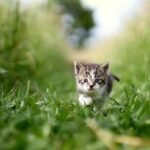Taming the Furball Fury: A Guide to the Best Supplements for Cats with Hairball Problems
Hairballs. The bane of many a cat owner’s existence. That gagging sound, the unsightly mess, the worried look on your feline friend’s face – it’s no fun for anyone. While hairballs are a relatively common occurrence in cats, especially long-haired breeds, frequent or severe hairball issues can be uncomfortable for your cat and even indicate an underlying problem.
Fortunately, there are many things you can do to help your cat manage hairballs, and supplements can play a significant role in keeping their digestive system smooth and happy. This guide explores the world of hairball supplements for cats, helping you understand what causes hairballs, what to look for in a supplement, and some of the best options available to help your kitty conquer the furball frenzy.
Understanding the Hairball Hassle: Why Do Cats Get Hairballs?
Cats are meticulous groomers. Their barbed tongues are perfectly designed to remove loose fur, which they then swallow. Usually, this fur passes through the digestive system without issue. However, sometimes the fur accumulates in the stomach and forms a hairball. When the hairball becomes too large to pass through the digestive tract, the cat will attempt to regurgitate it.
Several factors can contribute to hairball formation:
- Long Hair: Long-haired breeds like Persians and Maine Coons are more prone to hairballs simply because they ingest more fur while grooming.
- Excessive Grooming: Over-grooming can be caused by stress, allergies, skin conditions, or even boredom.
- Diet: A dry food diet lacking sufficient fiber can contribute to hairball formation.
- Underlying Health Issues: In rare cases, digestive issues or other health problems can hinder the passage of fur through the digestive system.
- Age: Older cats may have decreased digestive efficiency, making them more susceptible to hairball formation.
Recognizing the Signs: When to Worry About Hairballs
While occasional hairballs are normal, it’s important to be aware of the signs that indicate a more serious issue. Contact your veterinarian if your cat experiences any of the following:
- Frequent Hairballs: Regurgitating hairballs more than once or twice a month.
- Difficulty Regurgitating: Struggling to bring up a hairball.
- Loss of Appetite: Refusing to eat or showing a decreased appetite.
- Lethargy: Acting tired or weak.
- Constipation: Difficulty passing stool.
- Diarrhea: Loose or watery stool.
- Coughing or Wheezing: Persistent coughing or wheezing that isn’t related to hairball expulsion.
- Swollen Abdomen: A distended or painful abdomen.
These symptoms could indicate a more serious problem, such as a blockage in the digestive tract, which requires immediate veterinary attention.
Supplements to the Rescue: How They Help With Hairballs
Hairball supplements are designed to help cats manage and prevent hairball formation by:
- Lubricating the Digestive Tract: Many supplements contain ingredients that help lubricate the digestive tract, making it easier for fur to pass through.
- Promoting Healthy Digestion: Some supplements include ingredients that support healthy digestion, ensuring efficient processing of food and fur.
- Breaking Down Hairballs: Certain ingredients can help break down hairballs, making them easier to eliminate.
- Reducing Shedding: Some supplements contain nutrients that promote healthy skin and coat, reducing excessive shedding and minimizing the amount of fur ingested during grooming.
Decoding the Ingredients: What to Look for in a Hairball Supplement
When choosing a hairball supplement for your cat, pay attention to the ingredients list. Here are some key ingredients to look for:
- Omega-3 & Omega-6 Fatty Acids: These essential fatty acids promote healthy skin and coat, reducing shedding and improving coat quality. Common sources include fish oil, flaxseed oil, and sunflower oil.
- Fiber: Fiber helps move fur through the digestive tract. Look for sources like psyllium husk, oat fiber, beet pulp, or powdered cellulose.
- Mineral Oil or Petroleum Jelly: These ingredients act as lubricants, helping hairballs slide through the digestive system. However, use them with caution and only as directed by your veterinarian, as they can interfere with nutrient absorption if used excessively.
- Enzymes: Enzymes like papain and bromelain can help break down proteins and other substances in the digestive tract, aiding in hairball breakdown.
- Lecithin: Lecithin is an emulsifier that can help break down fats and oils, aiding in the digestion of hairballs.
- Probiotics: Probiotics promote a healthy gut microbiome, which can improve digestion and overall digestive health.
- Natural Lubricants: Olive oil, coconut oil, and other natural oils can provide lubrication to help fur pass through the digestive tract.
Navigating the Options: Types of Hairball Supplements
Hairball supplements come in various forms, each with its own advantages and disadvantages:
- Hairball Treats: These tasty treats are often formulated with fiber and lubricants to help prevent hairball formation. They’re easy to administer, but be mindful of the calorie content, especially if your cat is prone to weight gain.
- Hairball Gels: Gels are usually flavored and can be applied to your cat’s paw or directly into their mouth. They provide lubrication and are often a good option for picky eaters.
- Hairball Pastes: Similar to gels, pastes are usually palatable and easy to administer. They offer lubrication and can contain other beneficial ingredients.
- Hairball Chews: Chews provide a tasty and convenient way to supplement your cat’s diet with hairball-fighting ingredients.
- Hairball Powders: Powders can be mixed into your cat’s food, making them a good option for cats who don’t like treats or gels.
- Hairball Dry Food: Some dry cat food formulas are specifically designed to help prevent hairballs. These formulas typically contain higher levels of fiber and other beneficial ingredients.
- Hairball Liquid Supplements: These supplements can be added to your cat’s water or food.
Choosing the Right Supplement: Factors to Consider
Selecting the best hairball supplement for your cat depends on several factors:
- Your Cat’s Preferences: Does your cat prefer treats, gels, or powders? Choose a form that your cat will readily accept.
- Ingredients: Look for supplements with ingredients that address the underlying cause of your cat’s hairball issues. For example, if your cat has dry skin and excessive shedding, choose a supplement with omega fatty acids.
- Your Veterinarian’s Recommendation: Consult your veterinarian before starting any new supplement regimen. They can help you determine the best course of action for your cat’s individual needs.
- Quality and Reputation: Choose supplements from reputable brands with a history of producing high-quality products. Read reviews from other cat owners to get an idea of their experiences.
- Cost: Hairball supplements can vary in price. Consider your budget when making your decision.
Top Contenders: Some Popular Hairball Supplement Options
While it’s always best to consult with your veterinarian for personalized recommendations, here are a few popular and well-regarded hairball supplements that are readily available:
- Tomlyn Hairball Remedy Gel: This is a classic and widely used hairball remedy gel. It contains mineral oil to lubricate the digestive tract and is available in various flavors.
- Vet’s Best Hairball Relief Digestive Aid Soft Chews: These chews contain psyllium, marshmallow root, and other natural ingredients to support healthy digestion and reduce hairball formation.
- Nutri-Vet Hairball Paw-Gel: This palatable gel contains omega fatty acids, lecithin, and other ingredients to promote healthy skin and coat and help prevent hairballs.
- GimCat Malt Paste Extra: This paste contains natural malt extract and vegetable oil to help lubricate the digestive tract and facilitate the passage of hairballs.
- Purina Pro Plan Veterinary Diets Hairball Management Dry Cat Food: This dry food is formulated with high levels of fiber to help reduce hairball formation.
Beyond Supplements: A Holistic Approach to Hairball Management
While supplements can be a valuable tool in managing hairballs, they’re not the only solution. Here are some additional strategies to help keep your cat fur-free and comfortable:
- Regular Grooming: Brushing your cat regularly, especially during shedding season, helps remove loose fur before they can ingest it.
- Dietary Changes: Consider switching to a high-quality cat food that is rich in fiber and low in fillers. Wet food can also help keep your cat hydrated and aid in digestion.
- Hydration: Ensure your cat has access to plenty of fresh water. Proper hydration is essential for healthy digestion.
- Exercise and Play: Regular exercise can help stimulate digestion and reduce stress, which can contribute to over-grooming.
- Reduce Stress: Identify and address any potential stressors in your cat’s environment, such as loud noises, changes in routine, or the presence of other pets.
Important Considerations: Safety and Potential Side Effects
While generally safe, hairball supplements can sometimes cause side effects. Mineral oil, in particular, can interfere with nutrient absorption if used excessively. Always follow the manufacturer’s instructions and consult with your veterinarian if you have any concerns.
- Diarrhea: Some supplements, especially those containing high levels of fiber, can cause diarrhea.
- Vomiting: In rare cases, some cats may vomit after taking a hairball supplement.
- Allergic Reactions: Although uncommon, allergic reactions to certain ingredients are possible. Watch for signs of an allergic reaction, such as itching, swelling, or difficulty breathing.
The Takeaway: A Happy Cat is a Hairball-Free Cat
Hairballs are a common problem for many cats, but they don’t have to be a constant source of discomfort and worry. By understanding the causes of hairballs, choosing the right supplements, and implementing a holistic approach to hairball management, you can help your cat stay healthy, happy, and free from the furball fury. Remember to consult with your veterinarian to determine the best course of action for your cat’s individual needs and to rule out any underlying health issues. With a little care and attention, you can keep your feline friend purring contentedly, without the unwelcome interruption of hairballs.
Featured Image Credit: Pixabay


